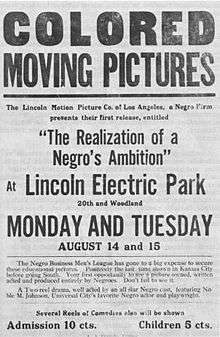Lincoln Motion Picture Company
The Lincoln Motion Picture Company was an American film production company founded in 1916 by Noble Johnson and George Johnson.[1] Noble Johnson was president of the company, the secretary was actor Clarence A. Brooks. Dr. James T. Smith was treasurer, and Dudley A. Brooks was assistant secretary.[2] The company is known as the first producer of race movies.[3][4][5] Established in Omaha, Nebraska, the company relocated to Los Angeles the following year. It remained in operation until 1923, closing shortly after announcing a final project, The Heart of a Negro.[6]

Background
In the first two decades of the 20th century African American audiences were ignored by film studios. Because African American audiences were ignored, there was a high demand for films geared to catering to black audiences. Thus bringing about the need for black motion picture production companies.
The Lincoln Motion Picture Company is considered the first all-black movie production company,[7] building a reputation for making films that showcased African American talent in the film industry. The company made and distributed only five films. These films were limited to African American audiences in churches, schools, and "Colored Only" theaters, despite the Johnson brothers wanting a wider audience. Unfortunately production expenses and low sales halted future films to be made and distributed. Noble left his position as president to become an actor at Universal Pictures, with Dr. James T. Smith taking over the position. The Lincoln Motion Picture Company lasted until 1921.[2]
Although the Lincoln Motion Picture Company did not last long, it was influential in the African American community. This company inspired the movement of more ethnic movie companies.
Filmography
- The Realization of a Negro's Ambition (1916)
- The Law of Nature (1916)
- Trooper of Company K (1917)
- A Man's Duty (1919)[8]
- By Right of Birth (1921)[6]
Footnotes
- "The Lincoln Motion Picture company, a first for Black cinema!" Archived September 30, 2007, at the Wayback Machine The African American Registry. Retrieved 8/4/07.
- "The Lincoln Motion Picture company, a first for Black cinema | African American Registry". aaregistry.org. Retrieved February 8, 2016.
- (2007) "African American History in the American West: Timeline", Black Past Website, hosted at University of Washington
- Sampson, Henry T. Blacks in Black and White: A Source Book on Black Films (1997), p. 27
- Flamming, Douglas. Bound for Freedom: Black Los Angeles in Jim Crow America, University of California Press, p. 89 (2005) – ISBN 0-520-23919-9
- Sampson, Henry T. Blacks in Black and White: A Source Book on Black Films, page 39
- "Lincoln Motion Picture Company | The Black Past: Remembered and Reclaimed". www.blackpast.org. Retrieved February 7, 2016.
- https://www.newspapers.com/clip/25844141/a-mans-duty-1919/
References
- Berry, S. Torriano. The 50 Most Influential Black Films: A Celebration of African-American Talent, Determination, Citadel Press, (2001) – ISBN 0-8065-2133-3
- Bowser, Pearl. Oscar Micheaux and His Circle: African-American Filmmaking and Race Cinema of the Silent Era, Indiana University Press, (2001) – ISBN 0-253-33994-4
- Jones, George William. Black Cinema Treasures: Lost and Found, University of North Texas Press, (1991) – ISBN 0-929398-26-2
- Reid, Mark A. Redefining Black Film, University of California Press, (1993) – ISBN 0-520-07902-7
- Sampson, Henry T. Blacks in Black and White: A Source Book on Black Films, The Scarecrow Press, Inc., New Jersery, (1997) – ISBN 0-8108-1023-9
- Stewart, Jacqueline. Migrating to the Movies: Cinema and Black Urban Modernity, University of California Press, (2005) – ISBN 0-520-23349-2